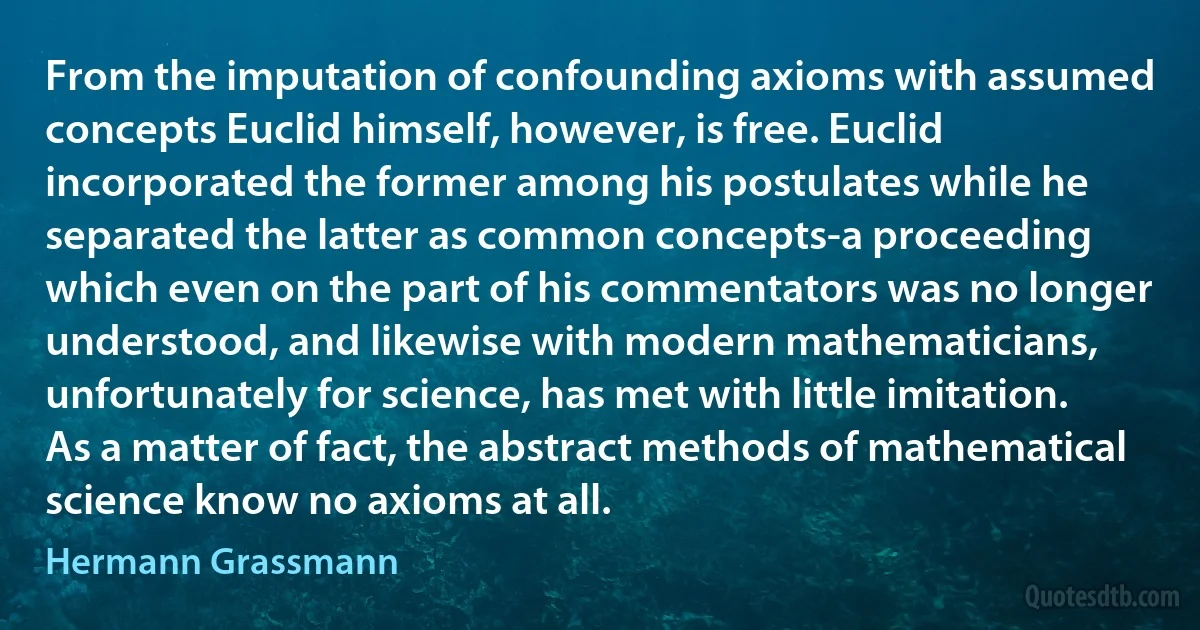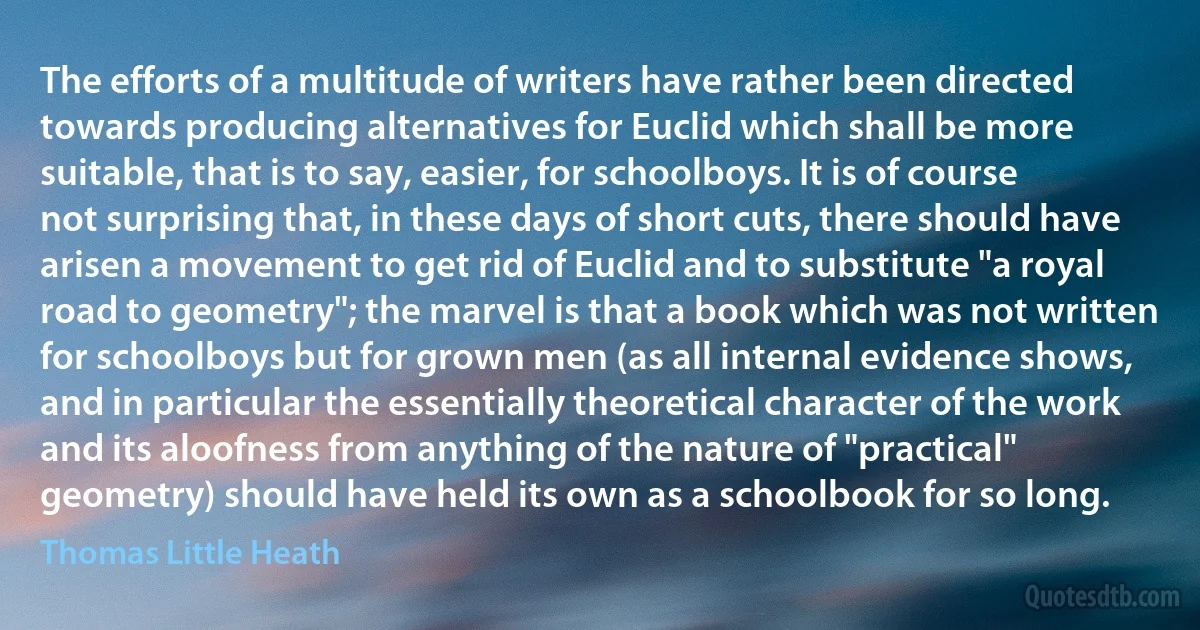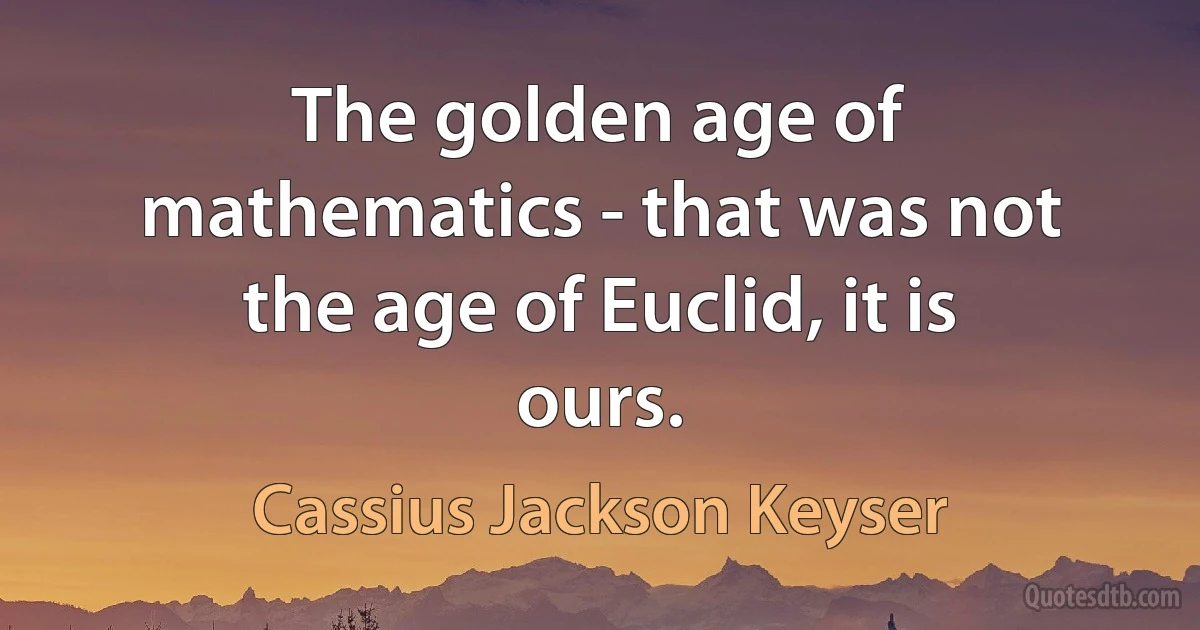Euclid Quotes - page 2
In other branches of science, where quick publication seems to be so much desired, there may possibly be some excuse for giving to the world slovenly or ill-digested work, but there is no such excuse in mathematics. The form ought to be as 102 perfect as the substance, and the demonstrations as rigorous as those of Euclid. The mathematician has to deal with the most exact facts of Nature, and he should spare no effort to render his interpretation worthy of his subject, and to give to his work its highest degree of perfection. "Pauca sed matura” was Gauss's motto.

James Whitbread Lee Glaisher
The attempt to avoid a direct affirmation about infinite parallel straight lines caused Euclid to phrase the parallel axiom in a rather complicated way. He realized that, so worded, this axiom lacked the self-sufficiency of the other nine axioms, and there is good reason to believe that he avoided using it until he had to. Many Greeks tried to find substitute axioms for the parallel axiom or to prove it on the basis of the other nine. ...Simplicius.

Morris Kline
The outstanding personalities of Euclid and Archimedes demand chapters to themselves. Euclid, the author of the incomparable Elements, wrote on almost all the other branches of mathematics known in his day. Archimedes's work, all original and set forth in treatises which are models of scientific exposition, perfect in form and style, was even wider in its range of subjects. The imperishable and unique monuments of the genius of these two men must be detached from their surroundings and seen as a whole if we would appreciate to the full the pre-eminent place which they occupy, and will hold for all time, in the history of science.

Thomas Little Heath
Euclid's work will live long after all the text books of the present day are superseded and forgotten. It is one of the noblest monuments of antiquity; no mathematician worthy of the name can afford not to know Euclid, the real Euclid as distinct from any revised or rewritten versions which will serve for schoolboys or engineers. And, to know Euclid, it is necessary to know his language, and, so far as it can be traced, the history of the "elements" which he collected in his immortal work.

Thomas Little Heath
Theodorus of Cyrene and Theaetetus generalised the theory of irrationals, and we may safely conclude that a great part of the substance of Euclid's Book X. (on irrationals) was due to Theætetus. Theætetus also wrote on the five regular solids, and Euclid was therefore no doubt equally indebted to Theætetus for the contents of his Book XIII. In the matter of Book XII. Eudoxus was the pioneer. These facts are confirmed by the remark of Proclus that Euclid, in compiling his Elements, collected many of the theorems of Eudoxus, perfected many others by Theætetus, and brought to irrefragable demonstration the propositions which had only been somewhat loosely proved by his predecessors.

Thomas Little Heath
Hippocrates himself is an example of the concurrent study of the two departments. On the one hand, he was the first of the Greeks who is known to have compiled a book of Elements. This book, we may be sure, contained in particular the most important propositions about the circle included in Euclid, Book III. But a much more important proposition is attributed to Hippocrates; he is said to have been the first to prove that circles are to one another as the squares on their diameters (= Eucl. XII., 2) with the deduction that similar segments of circles are to one another as the squares on their bases. These propositions were used by him in his tract on the squaring of lunes, which was intended to lead up to the squaring of the circle. The latter problem is one which must have exercised practical geometers from time immemorial. Anaxagoras for instance is said to have worked at the problem while in prison.

Thomas Little Heath
There has been a rush of competitors anxious to be first in the field with a new text-book on the more "practical" lines which now find so much favour. The natural desire of each teacher who writes such a text-book is to give prominence to some special nostrum which he has found successful with pupils. One result is, too often, a loss of a due sense of proportion... It is, perhaps too early yet to prophesy what will be the ultimate outcome of the new order of things; but it would at least seem possible that history will repeat itself and that, when chaos has come again in geometrical teaching, there will be a return to Euclid more or less complete for the purpose of standardising it once more.

Thomas Little Heath
My venture investing career has three phases, all roughly 6-8 years long. The first, at Euclid, was software to Internet. The second, at Flatiron, was Internet to bubble. And the third, at USV, has been web 2 to mobile. I have always used a new firm to denote a new investment phase for me. Throw away the old. Start with the new.

Fred Wilson
Although people cannot define existence and do use the term with some looseness, yet it is possible to give an extensive definition by pointing to the sorts of things that everyone believes to exist. It is still easier to point to the sort of entities that people agree in believing not to exist, and happily, this is really what concerns us most. People mean by saying that causation only applies to things that exist that it applies, if at all, to what can change; and they believe that, if anything can change, it is things like chairs and tables and minds, and not those like the propositions of Euclid and the multiplication table. What would be agreed then is that, if causal laws apply to anything it is to what can change in so far as it changes.

C. D. Broad
Four circles to the kissing come, The smaller are the benter. The bend is just the inverse of The distance from the centre. Though their intrigue left Euclid dumb There's now no need for rule of thumb. Since zero bend's a dead straight line And concave bends have minus sign, The sum of squares of all four bends Is half the square of their sum.

Frederick Soddy
At the age of eleven, I began Euclid, with my brother as my tutor. This was one of the great events of my life, as dazzling as first love. I had not imagined there was anything so delicious in the world. From that moment until I was thirty-eight, mathematics was my chief interest and my chief source of happiness.

Bertrand Russell
Every night as I gazed up at the window I said to myself softly the word paralysis. It had always sounded strangely in my ears, like the word gnomon in the Euclid and the word simony in the Catechism. But now it sounded to me like the name of some maleficent and sinful being. It filled me with fear, and yet I longed to be nearer to it and to look upon its deadly work.

James Joyce
MacUser: Which person do you most admire?
Jef Raskin: For what attribute? Once again you ask a question that linearises a complex matter. I can name many. Let's start with people named George: George Cantor for moving infinity out of philosophy into mathematics, George Washington for showing how a leader should relinquish power, and George Bernard Shaw for his humanity... Or we can do it by subject and admire Aristotle, Isaac Newton and Albert Einstein for their pulling from nature comprehensible laws; or Euclid, Gauss and Gödel for their contributions to mathematics; or people who have influenced me very directly, in which case I'd mention my very admirable parents and the teacher who taught me to be intellectually independent, L R Genise; or how about Claude Shannon without whose work on information theory I would have been lost.

Jef Raskin
Euclid... gave his famous definition of a point: "A point is that which has no parts, or which has no magnitude." ...A point has no existence by itself. It exists only as a part of the pattern of relationships which constitute the geometry of Euclid. This is what one means when one says that a point is a mathematical abstraction. The question, What is a point? has no satisfactory answer. Euclid's definition certainly does not answer it. The right way to ask the question is: How does the concept of a point fit into the logical structure of Euclid's geometry? ...It cannot be answered by a definition.

Freeman Dyson
My father, in my earliest childhood, taught me the rudiments of arithmetic, and about that time made me acquainted with the arcana; whence he had come by this learning I know not. This was about my ninth year. Shortly after, he instructed me in the elements of the astronomy of Arabia, meanwhile trying to instill in me some system of theory for memorizing, for I had been poorly endowed with the ability to remember. After I was twelve years old he taught me the first six books of Euclid, but in such a manner that he expended no effort on such parts as I was able to understand by myself.
This is the knowledge I was able to acquire and learn without any elementary schooling...

Gerolamo Cardano



